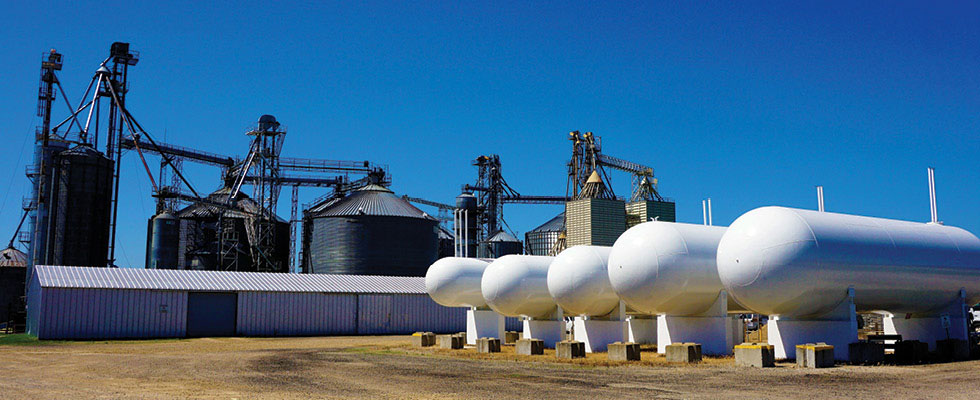
During my nearly 36-year career in the propane industry, I’ve worked with my colleagues to serve many agricultural customers. Farmers, brooders and others who run ag operations — big or small — play a critical role in our nation’s economy. We literally couldn’t survive without them, so it’s important we provide them with the propane service they need. That said, let’s address the fact up front that serving the ag market has gotten a bad rap over the years. Some propane marketers believe that serving ag customers means “high volume with low margins.” But the ag market can also be an important and profitable part of your business if you know what to look out for, plan ahead and take good care of your customers.
2023 Was a Good Year
EDP’s Central U.S. operations serve large farming operations, including dairy farms, hog farms, crop farms, brooder houses and other ag-based operations like greenhouses and nurseries. Over the course of this past year, grain drying was a big part of the business for this region. Fortunately, Mother Nature was kind to us this year and there was a big demand for grain drying. To provide helpful information for this article, I gathered four of EDP’s general managers from the Central Region: Lyons LP Gas in Lyons, Ohio; United Propane in Lancaster, Pennsylvania; Quality Propane in Burnsville, Minnesota; and Mount Perry Propane in Mount Perry, Ohio. Here are two trends, five pain points and four lessons they shared during our discussion.
Trends in the Agriculture Sector
Small farm operations are fewer and farther between. It is probably no surprise that many small farmers today have decided to either “go big or go home.” Unfortunately, many smaller family farms simply can no longer afford the equipment needed to make their operations efficient and profitable, so they are opting to sell to larger operators. If Mother Nature wreaks havoc on crops in one tough year, it can force many mom-and-pop operators to make the difficult decision to sell.
The marijuana market is emerging. In addition to serving large greenhouse operations, Rob Miller, general manager at Quality Propane, serves some marijuana grow-houses. Miller pointed out that although many grow-houses are near urban markets, which have access to natural gas, some larger operations are established in rural areas where their need for propane is growing.
Pain Points
Just as we do with residential heating, we compete against natural gas for agriculture customers. Despite the upfront cost to convert a large farming operation to natural gas, switching can be more cost-effective for the farmer in the long run. That said, some farmers who have converted may still rely on propane as a backup resource. In fact, Wes Johnson with Mount Perry Propane has one such large ag operation that converted to natural gas, but still relies on propane during peak natural gas demand for grain drying operations.
Pricing is always an issue. As noted earlier, the ag sector is known for lower margins, so you’ll have to be competitive. Pricing is something we deal with in all facets of our business — and with ag customers in particular. But it’s important to note that when you provide reliable, friendly service, price becomes less of a factor.
Solar is having an impact. Travis Wildermuth, general manager at United Propane, noted that given the increased interest in renewable energy, some farmers in the Midwest have opted to lease their farmland to large solar operators who then create solar fields. There is certainly plenty of buzz — both positive and negative — about solar fields, but the price offered to some farmers for their land has simply been too good to pass up. This allows the farmers to have guaranteed revenue, no matter the weather conditions or fluctuations in propane supply costs.
Financing ag customers can be an issue. Most ag operators will need 90-day credit terms so they can have the propane they need throughout their growing season and can plan to pay you after their crops or livestock go to market. Mark Crone with Lyons LP Gas suggests addressing this with your ag customers up front. One option to consider is requesting a down payment in advance, in return for the most favorable terms you can offer.
Stringent requirements for some customers can be a challenge. Given recent concerns about bird flu, if you have a brooder house customer, you may be required to take extra measures with each delivery. That could include having your drivers spray down their trucks upon arrival, then don a hazmat suit before making their deliveries, and spraying down/cleaning their trucks again before proceeding to their next customer.
Lessons Learned
Service is the key! Once you land a nice-sized ag operation as a customer, make certain you provide exceptional service. Tank monitors will certainly play a big role in your reliability. Fortunately, once you lock in a price up front, if your customer is happy with your service — and if your price is competitive — you’ll likely keep that customer year after year.
Some ag business is more consistent than others. Crone with Lyons LP Gas reports that dairy farms represent a significant portion of his business each year. And unlike grain drying — which is always at the mercy of the weather — dairy farms, turkey farms, brooder houses and other livestock operations need consistent propane throughout the year.
Greenhouses are another consistent sector. Wildermuth with United Propane reports that his large greenhouse customers also need consistent propane year-round. He has one big tomato greenhouse customer that requires a significant number of gallons annually. Crone also has large greenhouse customers who order transport loads delivered directly to their facility. That said, given the competition his greenhouse customers face with Walmart and other big box stores that operate garden centers, Crone said the number of transport loads have been dropping in recent years.
Be visible to your ag customers. In addition to ensuring your ag customers get reliable service, make sure you personally get to know the owner and/or his key employees. The owner or manager will want to know who is running the propane company that he or she is relying upon. Your occasional visit and friendly service can go a long way to keeping that business for many years.
In the end, agricultural customers aren’t all just high volume with low margins. Opportunities exist for consistent, long-term customers if you can offer competitive pricing and top-notch service — just like the competitive pricing and high-quality service you offer to all your customers.


